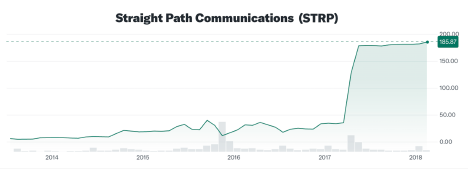Reading about spin off stocks, you come across IDT Corporation’s spinoff of Straight Path Communications. Most investors expect a small bump up in the shares of the spin off stock they bought, maybe a double. But Straight Path was one of the all time best spin offs.
What exactly happened, and what type of returns were eventually seen by investors? Let’s dive in, because the Straight Path Communications spin off is an interesting saga.
Straightpath Communications Spinoff
Straight Path Communications was spun off from its parent company, IDT Corporation, in 2013. Let’s lay out the basics behind the scenario. Here are the players, transaction details, pre and post share price movements, and status of the companies:
The Players -IDT Corporation (IDT), founded by serial entrepreneur Howard Jonas, is a $988.1 million diversified telecommunications and payment services provider. The firm’s offerings include a retail merchant point-of-sale (POS), terminal based platform, store management software, and peripheral merchant inventory support services. The company also provides international voice and SMS (short message service) offerings and telecom outsourced traffic management solutions.
More than this, though, IDT serves as a VC firm or incubator of sorts, with Chairman Howard Jonas funding smaller startups and then spinning them out after they achieve a sustainable growth path. Straight Path Communications was just one of those ventures.
Straight Path Communications, Inc. (Straight Path) was a $3.1 billion wireless communication license leasing company. Its subsidiary, Straight Path Spectrum, held extensive FCC 38 GHz and 28 GHz fixed wireless spectrum licenses, with supporting patents and other assets. The company supplied broadband services, capable of 5G+ upgrades, to all United States major and rural metropolises.
The Spin Off – IDT deciding it wanted to focus on its core business and unlock the value of its highly-sought license portfolio, spun off Straight Path in 2013.
Transaction Details – On July 13, 2013, IDT announced the pending spin off that became effective on July 31, 2013. The newly formed Straight Path Communications was capitalized with $15 million and supplied with its own board, management team, assets, and employees.
Straight Path Class A shares began trading under the ticker SPCI and on July 25, 2013, spinoff shares were distributed to parent company shareholders of record. Shareholders receive one SPCI Class A share for one IDT Class A share and one SPCI Class B share for one IDT Class B share. The Class B shares traded under the ticker STRP.
The share distribution was structured as a tax-free exchange for IDT and its shareholders, however, any cash received representing fractional share ownership was taxed as passive income.
IDT Stock Movement, Pre and Post Spin Off – Empirical data of parent company price behavior pre and post spinoff indicates a rise and fall pattern and IDT was no expectation. The chart below shows the share trajectory before the spinoff, at spinoff announcement, and one week, month, and year after the spinoff.

Before the spinoff, IDT’s shares were trading at $16.66 a share and rose 12% to $18.66 one week after the spinoff. However, the stock fell 15.62% one month after the spinoff and declined 10.76% one year after the spinoff.
Straight Path Price Performance Post Spin Off
Straight Path Communications' stock exhibited initial volatility and fluctuation around the spin-off, opening slightly higher than the initial trading price of $6.38 and experiencing a high of $6.40 and a low of $4.81 before settling at $5.67 on the day of the spin-off. In the week following the spin-off, the stock price decreased slightly to $5.20, reflecting potential market adjustments.
Over the subsequent month, the stock remained relatively stable, closing at $5.11, indicating a period of consolidation. However, six months after the spin-off, the stock price saw a significant increase to $7.85, suggesting improved performance and investor confidence. This positive trend continued, with the stock reaching $9.66 one year after the spin-off. Overall, Straight Path Communications demonstrated a pattern of initial adjustment followed by sustained growth and value appreciation following its spin-off.
What Happened to IDT and Straight Path?
IDT Corporation is an ongoing concern today in the telecommunications industry. Howard Jonas has continued to spin off divisions, creating massive value for his shareholders.
But the tail of Straight Path is even more interesting. Astute investors would have spotted at the time of the distribution that Straight Path held some very interesting assets - wireless spectrum licenses that Jonas had bought for a very cheap price. Those licenses would eventually be worth something to someone… but the question was how much.
On April 10, 2017, Straight Path received an unsolicited offer from AT&T to purchase the company for $95.63 a share, valuing the deal at $1.6 billion. Verizon Communications initiated a bidding war on May 11, 2017, and Straight Path eventually agreed to Verizon’s offer. Verizon outbid AT&T and purchased the prized firm for $3.1 billion, $184.00 a share, thus accelerating its ability to provide 5G internationally and solidifying its top-tier market position.

Investors who received shares in Straight Path when it was spun off from IDT in 2013 eventually saw their investment rise 32.45x, making Straight Path one of the all-time best spin off investments. $10,000 invested in Straight Path Communications at the time of the spin off would have become $324,500 in just 4.5 years… a compound annual return of around 125%.
This article was produced in collaboration with Evan Bleker.








